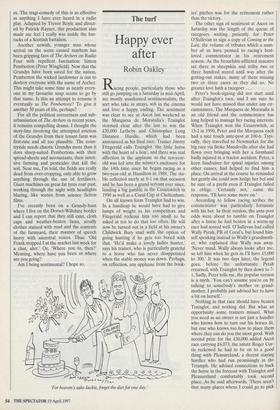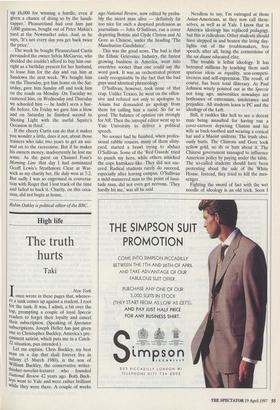The turf
Happy ever after
Robin Oakley
Racing people, particularly those who still go jumping on a Saturday in mid-April, are mostly unashamed sentimentalists, the sort who take in strays, sob in the cinema and love a happy ending. The sentiment was clear to see at Ascot last weekend as the Marquesa de Moratalla's Trainglot stormed clear after the last to win the £30,000 Letheby and Christopher Long Distance Hurdle, which had been announced as his final race. Trainer Jimmy Fitzgerald calls Trainglot `the little horse with the heart of a lion', and there was real affection in the applause as the ten-year- old was led into the winner's enclosure for the 14th time since he began racing as a two-year-old at Hamilton in 1989. The sta- ble collected nicely at 8-1 on that occasion and he has been a grand servant ever since, landing a big gamble in the Cesarewitch in 1990 as well as a Coral Cup at Cheltenham.
On all known form Trainglot had to win. In a handicap he would have had to give lumps of weight to his competitors and Fitzgerald reckons him too small to be asked at ten to do that too often. He will now be turned out in a field at his owner's Childwick Bury stud with the option of going hunting if he gets too bored with that. `He'd make a lovely ladies hunter,' says his trainer, who is particularly grateful to a horse who has never disappointed when the stable money was down. Perhaps, on reflection, any applause from the book- For heaven's sake Jackie, forget the diet for one day.' ies' pitches was for the retirement rather than the victory.
The other sign of sentiment at Ascot on Saturday was the length of the queue of racegoers waiting patiently for Peter O'Sullevan to sign a copy of Coming to the Last, the volume of tributes which a num- ber of us have penned to racing's best- loved commentator in his retirement season. As the bronchitis-afflicted maestro sat there in sheepskin and trilby two or three hundred stayed until way after the getting-out stakes, many of them missing two or three races as they did so. No greater love hath a racegoer . . .
Peter's book-signing did not start until after Trainglot's race, and I am sure he would not have missed that under any cir- cumstances. The Marquesa de Moratalla is an old friend and the commentator has long helped to manage her racing interests. When Trainglot won the Cesarewitch, at 13-2 in 1990, Peter and the Marquesa each had a nice touch ante-post at 100-6. Typi- cally, they travelled to Newmarket for the big race via Stoke Mandeville after she had flown over bringing with her a farmhand badly injured in a tractor accident. Peter, a keen fundraiser for spinal injuries among other causes, had helped to find him a place. On arrival at the course he reminded her gently she could now hedge her bet and be sure of a profit even if Trainglot failed to oblige. 'Certainly not,' came the response, 'I'll have some more on.'
According to fellow racing scribes the commentator was particularly fortunate with his bet. In their version, the ante-post odds were about to tumble on Trainglot after a horse he had beaten in a warm-up race had scored well. O'Sullevan had called Wally Pyrah, PR of Coral's, but found him- self speaking instead to Wally's grandmoth- er, who explained that Wally was away. `Never mind, Wally always looks after me, so tell him when he gets in I'll have £5,000 to 300.' It was two days later, the legend goes, before the unfortunate Pyrah returned, with Trainglot by then down to 7- 1. Sadly, Peter tells me, the popular version is a myth. 'You can't assume you're on by talking to somebody's mother or grand- mother. I probably just advised her to have a bit on herself.'
Nothing in that race should have beaten Trainglot, and nothing did. But what an opportunity some trainers missed. What you need as an owner is not just a handler who knows how to turn out his horses fit, but one who knows too how to place them where they can do you the most good. With second prize for the £30,000 added Ascot race carrying £6,073, the astute Roger Cur- tis reckoned he had to be on to a good thing with Pleasureland, a decent staying hurdler who had run promisingly in the Triumph. He advised connections to back the horse in the forecast with Trainglot and Pleasureland comfortably took second place. As he said afterwards, `There aren't that many places where I could go to pick up £6,000 for winning a hurdle, even if given a chance of doing so by the handi- capper.' Pleasureland had cost him just 3,000 guineas, bought out of Peter Makin's yard at the Newmarket sales. And, as he says, It's not every day you get back twice the price.'
The week he bought Pleasureland Curtis persuaded the owner Sylvia McGarvie, who decided she couldn't afford to buy him out- right as a birthday present for her husband, to lease him for the day and run him at Sandown the next week. 'We bought him on the Thursday, got him home on the Sat- urday, gave him Sunday off and took him on the roads on Monday. On Tuesday we cantered him, on Wednesday and Thursday we schooled him — he hadn't seen a hur- dle before. On Friday we gave him a blow and on Saturday he finished second to Shoting Light with the useful Squire's Occasion in third.'
If the cheery Curtis can do that it makes you wonder a little, does it not, about those trainers who take two years to get an ani- mal on to the racecourse. But if he makes his owners money, inadvertently he lost me some. As the guest on Channel Four's Morning Line that day I had nominated Geoff Lewis's Strathmore Clear at War- wick as my charity bet. He duly won at 7-2. But sadly I was so engrossed in conversa- tion with Roger that I lost track of the time and failed to back it. Charity, on this occa- sion, did not begin at home.
Robin Oakley is political editor of the BBC.



































































 Previous page
Previous page